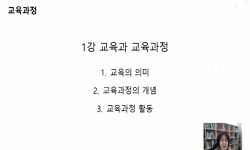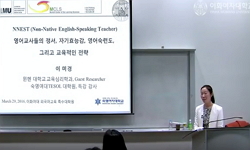본 연구는 10년 이상의 고경력을 가진 중등 국어과 교사 5명을 대상으로 포커스 그룹 인터뷰(FGI)를 실시하고 이를 분석하여, ‘교사 교육과정’ 개발의 관점에서 수업의 기획과 실천 과정에...
http://chineseinput.net/에서 pinyin(병음)방식으로 중국어를 변환할 수 있습니다.
변환된 중국어를 복사하여 사용하시면 됩니다.
- 中文 을 입력하시려면 zhongwen을 입력하시고 space를누르시면됩니다.
- 北京 을 입력하시려면 beijing을 입력하시고 space를 누르시면 됩니다.

고경력의 중등 국어과 교사는 수업을 어떻게 기획하고 실천하는가? - ‘교사 교육과정’ 개발 관점에서 바라본 국어 교사 5인의 수업 이야기 - = How Do Experienced Korean Language Teachers Design and Deliver Secondary Lesson? - Narrative of the Teaching Practices of Five Teachers from the Perspective of “Teacher Curriculum” Development -
한글로보기https://www.riss.kr/link?id=A109744240
- 저자
- 발행기관
- 학술지명
- 권호사항
-
발행연도
2025
-
작성언어
Korean
-
주제어
teacher curriculum ; Korean language class ; Korean language teachers ; practical knowledge ; teacher professionalism ; teacher agency ; teachers’ perceptions ; curriculum reconstruction ; curriculum development ; FGI ; 교사 교육과정 ; 국어 수업 ; 국어 교사 ; 실천적 지식 ; 교사 전문성 ; 교사 주도성 ; 교사 인식 ; 교육과정 재구성 ; 교육과정 개발 ; FGI
-
등재정보
KCI등재
-
자료형태
학술저널
- 발행기관 URL
-
수록면
1-57(57쪽)
- 제공처
-
0
상세조회 -
0
다운로드
부가정보
국문 초록 (Abstract)
본 연구는 10년 이상의 고경력을 가진 중등 국어과 교사 5명을 대상으로 포커스 그룹 인터뷰(FGI)를 실시하고 이를 분석하여, ‘교사 교육과정’ 개발의 관점에서 수업의 기획과 실천 과정에서 나타나는 인식의 구도를 상세화하는 데 목적이 있다. 먼저 ‘교사 교육과정 개발’ 개념에 관한 이론적 검토를 바탕으로 교사 교육과정은 교사의 실천적 지식에 기반하여 수업의 기획-개발-적용-실천의 제반 과정에 관여하는 개념임을 확인하였다. 다음으로 FGI를 통해 국어 교사들이 교육과정 성취기준을 재구성하거나 창의적으로 교사 교육과정을 개발하는 데 영향을 미치는 요소를 탐색하였다. 그 결과 교사 교육과정의 개발에는 크게 1) 학습자 요인: 수준과 특성, 제재 및 주제의 내용에 대한 학습자의 선호도, 수행 과제의 실제성, 2) 교사 요인: 신념, 메타적 성찰을 통한 수업 확장, 동교과 교사와의 협업, 3) 환경 및 맥락 요인: 평가 방식, 새로운 교육 제도, 활용 가능한 수업 자원, 예상 문제점의 사전 인식과 관련한 요소들이 종합적으로 적용된다는 점을 도출하였다. 이 연구는 중등 국어교육에서 ‘한 개인으로서의 교사’가 가지는 ‘주도성’과 ‘전문성’을 강조하며, 향후 교사 교육과정 개발을 지원하는 데 필요한 시사점을 제공한다는 점에서 의의를 갖는다.
다국어 초록 (Multilingual Abstract)
This study aims to explicate teachers' perceptions during lesson planning and enactment from the perspective of the 'teacher curriculum.' focus group interviews (FGI) were conducted with five secondary Korean language teachers possessing over 10 years...
This study aims to explicate teachers' perceptions during lesson planning and enactment from the perspective of the 'teacher curriculum.' focus group interviews (FGI) were conducted with five secondary Korean language teachers possessing over 10 years of teaching experience to examine factors influencing curriculum reconstruction and instructional design. Initially, theoretical review confirmed that teacher curriculum, grounded in teachers' practical knowledge, includes phases of lesson planning, development, application, and enactment. Qualitative analysis of FGI data identified three categories of influencing factors: 1) learner factors—students' cognitive levels and characteristics, instructional content structure, and authentic context; 2) teacher factors—pedagogical beliefs, instructional deepening through metacognitive reflection, and collaborative relationships with colleagues; and 3) contextual factors—assessment systems, educational policy impacts, instructional resource availability, and anticipation of teaching challenges. This study emphasized teacher agency and professionalism in secondary Korean language education, providing scholarly and practical implications for future teacher curriculum development.
동일학술지(권/호) 다른 논문
-
인공지능 활용 글쓰기의 윤리적 쟁점 탐색 - 표절 문제를 중심으로 -
- 한국어교육학회
- 김희동
- 2025
- KCI등재
-
- 한국어교육학회
- 천경록
- 2025
- KCI등재
-
자기서사로서 내방가사를 활용한 한국어 수업방안 - 여성 결혼이민자를 대상으로 -
- 한국어교육학회
- 윤선숙
- 2025
- KCI등재
-
중학생 대상 말하기 평가 도구의 개발 및 시행 결과 분석 - 평가 타당도를 중심으로 -
- 한국어교육학회
- 최영인
- 2025
- KCI등재




 KISS
KISS






